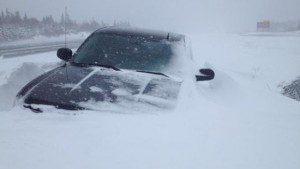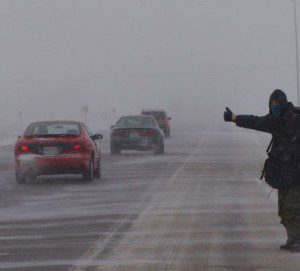
I had worked late into this particular winter’s night. I could have stayed in the city overnight. But I felt I should try to get home through the snowstorm. In Saskatchewan, that wasn’t a smart idea. And when I left the highway that February night, I encountered snowdrifts too deep and broad for my 1967 Valiant to penetrate. It was 3 a.m. and I was stuck in a snow bank miles from anybody. (And this in a day with no cell phones).
“Never abandon your car in a snowstorm,” I recall all of my experienced prairie friends telling me. And yet that’s exactly what I did to try to get help. I managed to reach a farmhouse, call my brother-in-law and he roared down the grid road in his four-wheel-drive truck and pulled me out.
“Don’t ever do that again,” he scolded me.
“Except, I know you’ll rescue me,” I joked. He wasn’t amused.
Winter weather is not to be trifled with, whether in the middle of a frozen prairie or on a frigid downtown street.
Me? I’ve just been very lucky over the years. I remember, for example, being a teenager in the 1960s and one of the routines I normally undertook (though I would never recommend it to a teenager today) was hitchhiking to a farmhouse out in the country each Friday night when my Ryerson Polytechnical Institute classes were finished for the week.

This one Friday night, an eastbound ride on Hwy 401 dropped me at the ramp to the northbound Hwy 115/35 (east of Toronto). All I needed was another hitch eight or 10 miles from there to Pontypool, Ont., and I’d be home and out of the cold. Except this night the weather along Lake Ontario was completely inhospitable – snow accumulating, wind whipping and temperature plummeting. Nobody was on the road … except the occasional transport. Miraculously, one stopped in the tunnel under 401 and picked me up.
“I can’t thank you enough,” I told the driver.
“You can thank me by never pulling this stunt again,” he said. And he proceeded to tear a trip off me for trying to hitch in such horrible weather. He claimed he was probably the only semi on the road for 20 or 30 miles and if he hadn’t happened along, they’d probably have found me frozen to death in a snowdrift the next morning.
Many years later, on a Christmas Eve when my wife and I and our two young daughters were on the road from Edmonton to Saskatoon, we ran into an equally daunting storm. The highway was awfully wind-blown and the prairie temperatures down around minus-30. We had nearly reached the halfway point, in the town of Wainwright, near the Alberta-Saskatchewan border. The car was loaded with gifts and goodies for the in-laws with whom we would be celebrating the next day. We had stopped for a very late dinner at restaurant in town. As we left, the Lebanese restaurateur escorted us to the door. We were the last customers of the night.
“Merry Christmas,” the man said, “and have a safe trip.”
He locked the door behind us, turned out the restaurant lights and I looked down at the trunk of the car resting unusually low to the ground. I realized it wasn’t the load in the trunk that made the car sit so low. The rear tire was flat. My heart sank and I swore, a most inappropriate thing to do on Christmas Eve. But suddenly the lights in the restaurant came back on and our host emerged putting his coat on. He must have heard my curse or recognized my anguished body posture.
“Flat tire?” the restaurateur said.
“Yes. And I don’t have a spare,” I added.
“Yes. A problem,” he noted. “But we can solve it.”
Within moments, he had invited my wife and the girls back inside the restaurant to stay warm. All the girls talked about for weeks was the hot chocolate his wife prepared. Meanwhile, my impromptu saviour was on the phone to the only gas station in town. It had closed sometime earlier, but with a few words of encouragement, the café owner had convinced the garage owner to meet us at the station.
We removed all the Christmas gifts from the trunk and piled them inside the restaurant. We jacked up the lightened rear of the car and removed the flat. He warmed up his car, drove me to the garage and stayed until my tire was repaired. He drove me back, helped me bolt on the repaired tire. And for a second time wished me, “Merry Christmas.”
I offered to pay him for his trouble, but all he asked was that I pass on the favour, which I have done on several occasions. I’ve always figured, if others are as dependent on helpful truck drivers, in-laws and good Samaritan restaurateurs to get through winter as I am, I’d better try to do my fair share.
Never pictured you as such an irresponsible youth Ted! 😉
An Arctic climate can do strange things to an 18-year-old’s perceptions, even the best of them.